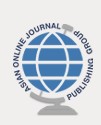Water, Conflicts and Migration and the Role of Regional Diplomacy: Lake Chad, Congo Basin, and the Mbororo Pastoralist

The Congo Basin is a vital water artery in Central Africa and holds more than 50 % of Africa's surface water. Despite the abundance of natural and human resources, the region faces a multitude of social, political, and governance challenges exacerbated by the climate crisis and water stress settings. These conditions severely impact native communities and pastoral populations living in vulnerable conditions with millions displaced or forced to migrate. The shrinking of Lake Chad Basin (LCB) has had multifaceted consequences both directly and indirectly, including forced displacement, violent conflicts, and political instability across the Sahel. The 'complex loop' of water-migration-conflict and climate change impacts is influencing regional governance strategies, particularly those related to cross-border agendas of water management, governance operations, and water sharing. Towards an enhanced understanding of this loop, this synthesis presents few key aspects and refreshed insights to guide the current and future regional discourse on hydrodiplomacy. The data and knowledge, observations, and analysis from the project 'Addressing Climate and Water Driven Migration and Conflict Interlinkages to Build Community Resilience in the Congo Basin' (2017–2021) provide empirical insights. The LCB and the Congo Basin serve as a case study to examine the multifaceted spill over effects of conflict and migration in a complex sociocultural context, where state and customary water-sharing norms apply in tandem. The hydrodiplomacy construct for this synthesis focuses on 'participation' and 'cooperation' and the Inter-Basin Water Transfer (IBWT) project Transaqua. The next section of the paper unpacks the loop within water stress-induced migration and conflict episodes, focusing on Mbororo pastoralists. Key findings highlight that the LCB and the Congo Basin historic water-sharing arrangements for the pastoralist community and the shift towards large-scale commerce and economics-oriented notions of water management, such as Transaqua, are handled in isolation. These aspects are clearly interconnected and should be appropriately factored in the region’s emerging hydrodiplomacy discourse. Secondly, participation of communities and stakeholders in decision making remains crucial to the balance of the complex geopolitical relations and, for understanding the effects of these crises on conflicts, migration and water diplomacy. Additionally, up-to-date data and information are significant for the future of hydrodiplomacy in the Chad-Congo equation, as water politics dynamics in the region is strained and hydrodiplomacy is in a juvenile stage. To conclude, it is suggested that regional hydrodiplomacy is explored as a win-win solution while ensuring that existing discussions are inclusive, reflective of local and cultural contexts, and community needs are appropriately integrated. The synthesis proposes that States with shared water-related challenges could view hydrodiplomacy as a tool for consensus-building and supporting long-term regional water governance plans and policies.







